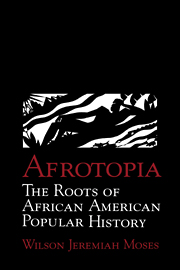Book contents
- Frontmatter
- Contents
- Acknowledgments
- Dedication
- 1 Introduction
- 2 Varieties of Black Historicism
- 3 From Superman to Man
- 4 Progress, Providence, and Civilizationism
- 5 W. E. B. Du Bois and Antimodernism
- 6 Afrocentrism, Cosmopolitanism, and Cultural Literacy in the American Negro Academy
- 7 Caliban's Utopia
- 8 Barbarism Grafted onto Decadence
- 9 Conclusion
- Notes
- Index
6 - Afrocentrism, Cosmopolitanism, and Cultural Literacy in the American Negro Academy
Published online by Cambridge University Press: 10 November 2009
- Frontmatter
- Contents
- Acknowledgments
- Dedication
- 1 Introduction
- 2 Varieties of Black Historicism
- 3 From Superman to Man
- 4 Progress, Providence, and Civilizationism
- 5 W. E. B. Du Bois and Antimodernism
- 6 Afrocentrism, Cosmopolitanism, and Cultural Literacy in the American Negro Academy
- 7 Caliban's Utopia
- 8 Barbarism Grafted onto Decadence
- 9 Conclusion
- Notes
- Index
Summary
On August 23, 1941, William H. Ferris died, penniless and obscure, in his room at 10 West 123 Street, Harlem. His obituary in The Journal of Negro History described him as “a man whose career it is difficult to estimate. … His body was saved from the Potter's Field through the action of the treasurer of Yale, a member of Ferris's class of 1895.” Ferris was one of those figures in African American history who may easily be reduced by the heartless to an Amos-and-Andy caricature of the “miseducated Negro.” He has, in fact, usually been handled by historians in just that fashion. Stephen Fox, writing with precocious arrogance, described him as “an interesting, erratic individual [who] spent much of his time freeloading, an embarrassing illustration of the classically educated, unemployed Negro.” In 1913 Ferris published his major work, in two volumes, The African Abroad or His Evolution in Western Civilization, Tracing His Development Under Caucasian Milieu, which Fox describes as “a chaotically organized mass of material, with some significant details and insights.” In all fairness to their author, these remarks only paraphrase opinions handed down by Ferris's black contemporaries. More recently, Rayford Logan in The Dictionary of American Negro Biography acknowledged Ferris as an innovative researcher and a serious bibliophile, whose contributions to the history of the African diaspora informed much subsequent research in the field.
- Type
- Chapter
- Information
- AfrotopiaThe Roots of African American Popular History, pp. 169 - 192Publisher: Cambridge University PressPrint publication year: 1998
- 1
- Cited by



